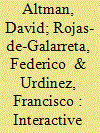| Srl | Item |
| 1 |
ID:
184322


|
|
|
|
|
| Summary/Abstract |
The idea of Chile as a ‘bridge country’ that connects – or should connect – Latin America with the Asia-Pacific region has guided its commercial diplomacy since the early 1990s. We argue that this geopolitical vision corresponds closely with what network analysts describe as a ‘broker’: an actor that bridges ‘structural holes’ by connecting otherwise disconnected actors or groups of actors. As a relational approach, social network analysis provides an alternative way of thinking about Chile’s position in international relations that does not rely on preconceived groupings or rank orders based on country attributes, as in the case of ‘middle powers’ and ‘small states.’ Further, the approach allows us to empirically explore which countries of the Pacific Basin currently perform such a role and whether (and when) Chile conforms to the theoretical expectations of a ‘transpacific broker.’ Using network data on commercial agreements (1980–2018), we trace Chile’s emergence as a transpacific broker and discuss how its commercial diplomacy provided the country with leverage in this regard. In doing so, the study sheds light on the opportunities and limitations of peripheral actors seeking to gain social capital through networks of relations.
|
|
|
|
|
|
|
|
|
|
|
|
|
|
|
|
| 2 |
ID:
178716


|
|
|
|
|
| Summary/Abstract |
Democracies do not take up arms against each other. Although this axiom has attained the status of a mantra in the field of international relations, this statement is much more complex than it appears, in part because it is highly contingent on the definitions and operationalizations of both democracy and conflict. This article revisits democratic peace theory, combining both institutional constraints and similarity-based arguments. Interactions between the democratic level of the dyad (the average democratic level of its members) and its democratic spread (difference between the democratic scores of its members) create a dyadic triangle that encompasses all possible combinations of cases, revisiting which dyads are more prone to conflict. The findings partially confirm and partially refute both the institutional constraints and the similarity-based arguments, leading to a nuanced alternative theory: the Interactive Model of Democratic Peace. Akin to democratic peace theory, our evidence shows that the higher a dyad’s level of democracy is, the lower the probability of fatal militarized interstate disputes between that pair of states. However, contrary to democratic peace theory, we find that dissimilar-regime dyads can still be peaceful as long as they have a high mean of democracy. Following the theory of regime similarity, we consider the democratic spread of each dyad, but we find that being similar is not a sufficient condition for peace between the members of a dyad. From the empirical evidence, the article derives three heuristic zones of conflict, filling much of the gray area that has been left unexplained by previous models.
|
|
|
|
|
|
|
|
|
|
|
|
|
|
|
|